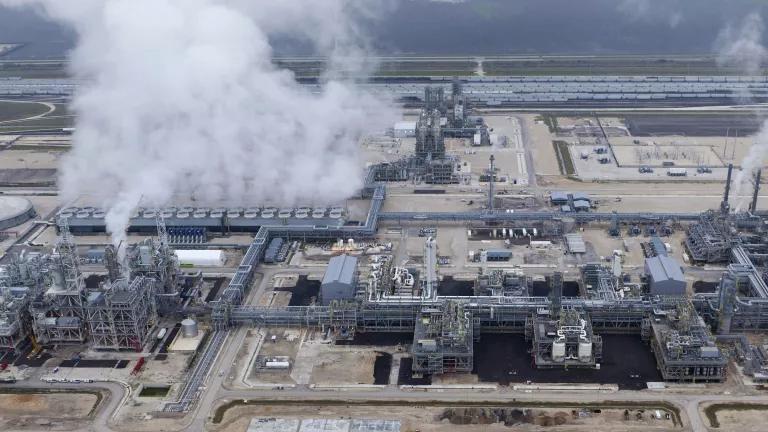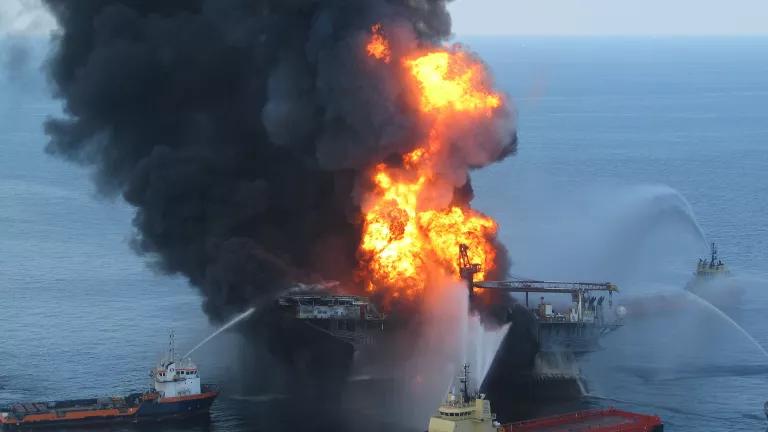NRDC & Allies Advocate for a Ban on Fracking in the Delaware

Yesterday, NRDC joined people from all walks of life in Washington Crossing, PA to speak at the Delaware River Basin Commission’s (DRBC) business meeting in support of a ban on fracking in the Delaware River Watershed. We addressed all five members—representatives of the governors of New York, Pennsylvania, New Jersey, and Delaware, as well as a federal representative from the Army Corps of Engineers.
As I’ve previously written, the natural gas industry is actively trying to open the Delaware River Basin up to natural gas fracking—but we can stop them. The Delaware River Basin provides drinking water for over 17 million people in five states, including to residents of New York City and Philadelphia.
Since 2010, the DRBC has maintained a de facto moratorium on natural gas extraction projects in the Delaware River Basin while they study its potential impacts. Yesterday, advocates from across the region shared that the scientific, moral, health and public policy imperatives require a permanent ban so that fracking will never be allowed to endanger the Delaware River Watershed.
Below are excerpts from our statements made before the DRBC commissioners in support of a ban:
“We’ve seen here in Pennsylvania, and across the country, the dangers that fracking poses to communities. You don’t have to go very far from here to see that gas drilling industrializes our towns. It also threatens the health of our families. People living in proximity to fracking wells and wastewater injection wells are on record experiencing serious respiratory issues, pregnancy complications, PTSD, endocrine abnormalities, among other symptoms. Regulations will not prevent these harmful impacts.
“In 2015, New York State Governor Cuomo demonstrated tremendous leadership by making New York State the first state with natural gas reserves to ban fracking within its borders. In support of the ban, the state cited the overwhelming scientific evidence of fracking’s harm to public health.
“Since then, the scientific evidence showcasing the dangers of fracking has only intensified. Just a few months ago, the republican governor of Maryland, Larry Hogan, signed a bill into law banning fracking. These developments are not made in isolation—people in states across the country continue to advocate for bans and moratoria against this dangerous practice. It’s time to add the Delaware River Basin to this list.”
— Rob Friedman, Policy Advocate
“It was, in part, my time growing up paddling on the Delaware River that drove me to become an environmental lawyer. And it breaks my heart to think that future generations won't get to see the river the way I did. The way many of us here do.
“As Commission staffers, I imagine you know a great deal about the importance of the River Basin to all kinds of folks—that it’s home to 8.2 million residents, serves as a drinking water source for 15 million people, that its vibrant ecosystem supports a bustling, $25 billion economy responsible for 600,000 jobs for residents in all four states—and that all of this is imperiled if the area is opened to fracking.
“You know that as many as 4,000 wells could be sited here if permitted, and that there is a substantial body of scientific evidence documenting the harms that fracking presents to both the environment and public health.”
— Kim Ong, Staff Attorney
“Growing up in Washington Heights, it was easy for me to take for granted having good, clean drinking water come straight from the tap.
“But since moving to New Orleans two years ago, I’ve had to boil the water in my home as a result of invisible lead contamination and the presence of brain-eating amoeba. Not being able to drink, shower, or brush my teeth with my water came as a shock to me, having grown up drinking the water from the treasured Delaware River Basin. Just over 100 miles from here, in places like Susquehanna County, Pennsylvania, residents have navigated similarly disturbing risks in the form of water that appears turbid and ignites in flames.
— Shaun Abreu, Summer Legal Intern
Yesterday’s DRBC hearing is clear evidence that momentum is building for a ban on fracking in the Delaware River Basin. In a time when the federal government is doing all it can to erode basic safeguards to public health, we have a unique opportunity to harness state-level power to make real environmental progress. It’s time to ban fracking in the Delaware River Watershed.



